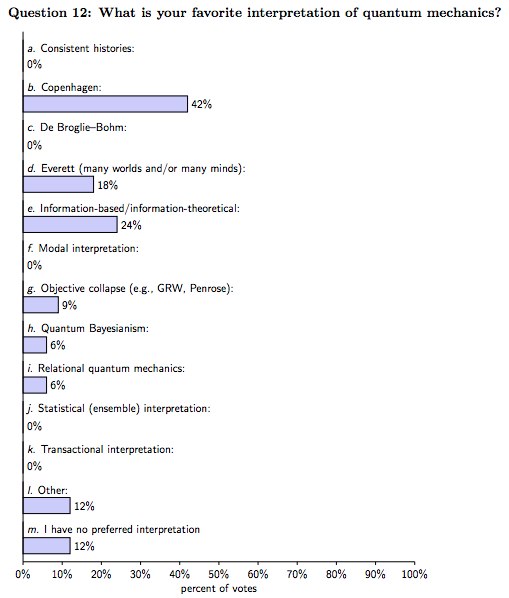Many Worlds isn't taken seriously because there's "proof" of other universes - it's taken seriously because it's actually the simplest explanation mathematically. The equations of quantum mechanics naturally lead to superpositions (particles existing in multiple states). MWI just says "what if we don't add extra rules to make those superpositions collapse?" It's like if you have a math equation that gives you 5 answers, and instead of creating a complicated rule to pick just one answer, you just accept all 5. Thats why physisists consider it - parsimony.
Ask Science
Ask a science question, get a science answer.
Community Rules
Rule 1: Be respectful and inclusive.
Treat others with respect, and maintain a positive atmosphere.
Rule 2: No harassment, hate speech, bigotry, or trolling.
Avoid any form of harassment, hate speech, bigotry, or offensive behavior.
Rule 3: Engage in constructive discussions.
Contribute to meaningful and constructive discussions that enhance scientific understanding.
Rule 4: No AI-generated answers.
Strictly prohibit the use of AI-generated answers. Providing answers generated by AI systems is not allowed and may result in a ban.
Rule 5: Follow guidelines and moderators' instructions.
Adhere to community guidelines and comply with instructions given by moderators.
Rule 6: Use appropriate language and tone.
Communicate using suitable language and maintain a professional and respectful tone.
Rule 7: Report violations.
Report any violations of the community rules to the moderators for appropriate action.
Rule 8: Foster a continuous learning environment.
Encourage a continuous learning environment where members can share knowledge and engage in scientific discussions.
Rule 9: Source required for answers.
Provide credible sources for answers. Failure to include a source may result in the removal of the answer to ensure information reliability.
By adhering to these rules, we create a welcoming and informative environment where science-related questions receive accurate and credible answers. Thank you for your cooperation in making the Ask Science community a valuable resource for scientific knowledge.
We retain the discretion to modify the rules as we deem necessary.
None.
It is, however, actually simpler than other theories, in that if you just let quantum mechanics do it's thing without extra (unknown) parts to limit it, it produces many worlds. So, by Occam's razor...
Specifically:
Quantum systems are in more than one classical state at a time, unavoidably. You can see this in the double slit experiment. Even if you send a single particle at a time through the slits, it passes through both and creates the interference pattern. (There's also ways to formally prove that making quantum mechanics normal would require fate, or faster-than-light trickery which would actually be worse than fate)
Early physicists were very confused by this. The Schrodinger's cat was used as a thought experiment meant to illustrate how that's absurd, and it was decided there must be something that causes quantum states to "collapse" to one state before they can cause any trouble.
That's not definitely wrong, and it's still debated in versions by modern theorists, but it turned out not to be necessary. The reason for that is that if a part of a quantum system becomes entangled with something outside of it, the interference will no longer happen, and it becomes indistinguishable from multiple slightly different copies of the same system.
None. There is absolutely no proof of many worlds or the multiverse. RE the god of the gaps. It's much more interesting to do physics rather than speculate about what falls outside the purview of the scientific method.
I do not understand how people can be so arrogantly confident about topics they clearly have not learned the basics of
How do you know I don't know the basics of physics?
Because I read your previous comment
But more than half of the comment was about doing physics
The “many worlds interpretation of quantum mechanics” is loosely that when you do a quantum coin flip, the universe splits into two universes, one for each result.
The reason for this thought is when you work with quantum mechanics, your system has a state that evolves smoothly, but if you “measure” it, the state suddenly snaps to (a random) one of the possible measurement values (when the coin isn’t being observed, it smoothly evolves, but once you measure it, it suddenly takes on a random value). However, if you expand your quantum description of the system to include your measurement device as well as the quantum “coin”, that sudden “snapping” goes away. Instead your whole system smoothly evolves, and it evolves into a “superposition” of the shared state of the state of the overall system in each of the possible measurement outcomes.
Extending this idea, it would seem that whenever you could describe a situation that acts like a “quantum coin flip”, both results happen, and the universe “splits”.
I really want to emphasize that the practical meaning of these “other worlds” is just that things are a lot “fuzzier” when you zoom in than classical statistics would suggest. Not that there’s another universe where you stayed with your ex or took a different career path or whatever.
Also this is an “interpretation” of quantum mechanics for good reason. It doesn’t really have any physical implications. In particular, it’s not possible to go “interact with” those “other universes”.
Most importantly, there are other “interpretations” of quantum mechanics, like that quantum mechanics is really a rethinking of statistics not of physics.

https://arxiv.org/abs/1301.1069
Effectively there is no current consensus on the issue, though Many Worlds and String Theory are widely regarded outside their adherents as non-falsifiable and therefore not legitimate theories.
Essentially the proponents of the theory have created beautiful math that fit their view, but absolutely nothing in the real world that can show that it is a more valid theory than any of the other theories which have equally elegant math to back them.